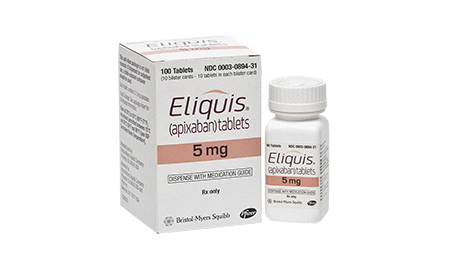Bristol-Myers Squibb and Pfizer got more juice for their blood drug Eliquis. The FDA approved apixaban for deep venous thrombosis and pulmonary embolism and for the reduction of risk of recurrent DVT and PE after initial therapy. The two conditions together are known as VTE. Forbes notes that the new indications give Eliquis the same status as Boehringer Ingelheim’s Pradaxa (dabigatran) and Janssen’s Xarelto (rivaroxaban), both of which are indicated for VTE. Despite a lackluster launch, Eliquis has since become as significant performer for BMS and Pfizer, and both have put a significant educational push behind the product.
The Drug Enforcement Agency is trying to make it more difficult to get prescription hydrocodone medications, and has moved the drugs from Schedule III to Schedule II status. The New York Times reports that the new rules mean doctors will no longer be able to call in prescriptions and that patients will have to book an office visit for a new prescription, since refills will no longer be allowed. “This is a sign of a shift towards more cautious opioid prescribing,” Tufts University School of Medicine assistant professor Nathaniel Katz told the Times. The US is the world’s largest prescription opioid market and abuse and painkiller-associated deaths have ravaged communities, but a University of California addiction specialist tells the Times that it’s unlikely this new rule will trigger a significant reversal in these trends. Instead, he said he expects abusers will move to oxycodone or heroin.
Auxilium Pharma may have found a new use for Xiaflex (collagenase clostridium histolyticum), which is currently indicated for Peyronie’s disease, or curvature of the penis: cellulite smoothing. The Chicago Tribune reports that test results indicate two doses could smooth out troublesome skin dimpling, which the Trib reports is estimated to affect around 85% to 95% of post-adolescent women.
Both Emory University Hospital Ebola patients have left the medical facility cured of the deadly virus which has swept West Africa and has killed around 1,350 patients. Aid workers Kent Brantly and Nancy Writebol worked at a treatment facility in Liberia where they contracted the virus. Although both received the experimental Zmapp medication, doctors are not yet saying Zmapp triggered the turnaround. Physician Bruce Ribner tells Bloomberg that Brantly received a blood transfusion from an Ebola survivor, and that this transfusion, as well as supportive care, electrolytes and comprehensive monitoring may be associated with his recovery. Containing the virus has become a local initiative and has included quarantines in Guinea, Sierra Leone and Liberia. Bloomberg reports these measures have inflicted “extreme hardship” on more than 1 million people. Calls for cures continue, and BioCentury Extra reports that the Research for Health in Humanitarian Crises is calling for Ebola treatment proposals that can be translated into clinical trials right now. The Wall Street Journal reports that animal testing indicates that an experimental treatment using ribonucleic acid interference—rNAI—could be an Ebola foe. The Journal says Tekmira Pharmaceuticals tested the drug in monkeys infected with the Marburg virus, which has similar effects to Ebola, and that all of the infected animals survived, but the untreated ones did not.
The ALS Ice Bucket Challenge has triggered an outpouring of videos showing politicians, celebrities and everyday people getting soaked to raise awareness and research cash for amyotrophic lateral sclerosis, also known as Lou Gehrig’s disease. The New York Times reports that the challenge has triggered $41.8 million in A.L.S. Association donations from July 29 through August 21 and that more than 739,000 of these donations are from new donors. The money is going to go towards research and supportive services for ALS patients. However, the campaign has raised another aspect of condition-research along with awareness: the Associated Press reports that a Roman Catholic diocese in Ohio is asking its schools to shun the challenge because the ALS Association endorses embryonic cell research, and that this is “in direct conflict with Catholic teaching.” Celebrity Pamela Anderson has come out against the challenge because ALS research uses animal test subjects. US Weekly reports that the PETA spokesperson said she enjoys a good dare, but “I’d thought instead, I’d challenge ALS to stop animal testing.” Anderson told the celeb-pub that recent tests have required drilling holes in animal skulls and injecting monkeys with chemicals, only to dissect them later.








